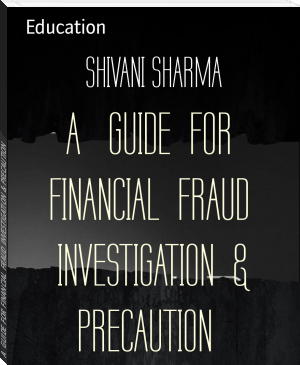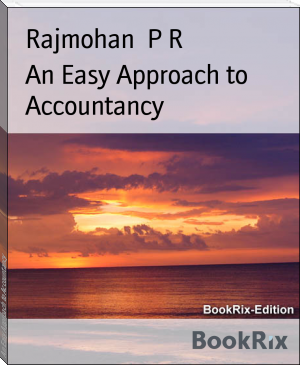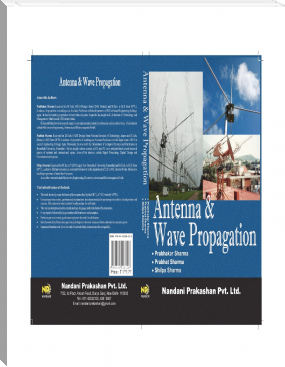A GUIDE FOR FINANCIAL FRAUD INVESTIGATION & PRECAUTION by SHIVANI SHARMA (books to read for beginners .txt) 📕

- Author: SHIVANI SHARMA
Book online «A GUIDE FOR FINANCIAL FRAUD INVESTIGATION & PRECAUTION by SHIVANI SHARMA (books to read for beginners .txt) 📕». Author SHIVANI SHARMA
In such cases, the Adjudicating Authority shall direct the release of all properties other than the properties involved in money-laundering to the person from whom such properties were seized or the person entitled to receive it [Section 20(5)].
However, the Director or any other officer authorised by him in this behalf, may withhold the release of any such property for a period of ninety days if he (Director of Enforcement) is of the opinion that such property is relevant for the appeal proceedings under this Act [Section 20(6)].
34)What will happen to the seized/frozen records after confiscation of property involved in money laundering or used for the commission of the offence of the money laundering under Section 8 of PMLA?
After an order of confiscation of properties under Section 8 has been passed, the Adjudicating Authority shall direct the release of the records to the person from whom such records were seized. However, the Director or any other officer authorised by him in this behalf, may withhold the release of any such record for a period of ninety days if he (Director of Enforcement) is of the opinion that such property is relevant for the appeal proceedings under this Act [Section 21(5 & 6)].
35) What will happen to the attached properties after conclusion of Trial for the offence of money laundering?
(i) Where on conclusion of a trial of an offence under this Act, the Special Court finds that the offence of money-laundering has been committed, it shall order that such property involved in the money-laundering or which has been used for commission of the offence of money-laundering shall stand confiscated to the Central Government.
(ii) Where on conclusion of a trial under this Act, the Special Court finds that the offence of money-laundering has not taken place or the properties not involved in money-laundering, it may order release of such property to the person entitled to receive it.
(iii) Where the trial under this Act cannot be conducted, by reason of the death of the accused or the accused having been declared a proclaimed offender or for any other reason or having commenced but could not be concluded, the Special Court, on an application moved by the Director or a person claiming to be entitled to possession of a property in respect of which an order has been issued by the Adjudicating Authority confirming the provisional attachment of the property, pass appropriate orders regarding confiscation or release of the property, as the case may be, after having regard to the material before it [Sub-sections (5) (6) & (7) of Section 8].
(iv) After an order of confiscation, all the rights and title in such property shall vest absolutely in the 23 Central Government free from all encumbrances [Section 9]
36)Which is the Appellate Authority against the order passed by Adjudicating Authority and what is the time limit to file appeal?
The Director or any person aggrieved by an order made by the Adjudicating Authority under this Act, may prefer an appeal to the Appellate Tribunal. Appeal has to be filed within a period of forty-five days from the date of receipt of a copy of the order made by the Adjudicating Authority. Appellate Tribunal may entertain an appeal after the expiry of the period of forty-five days if it is satisfied that there was sufficient cause for not filing it within that period [Section 26].
37)Which is the Appellate Authority against the order passed by Appellate Tribunal and what is the time limit to file appeal?
Any person aggrieved by any decision or order of the Appellate Tribunal may file an appeal to the High Court within sixty days from the date of communication of the decision or order of the Appellate Tribunal to him on any question of law or fact arising out of such order. Thus appeal can be filed before High Court on any question of law or fact. High Court may, if it is satisfied that the appellant was prevented by sufficient cause from filing the appeal within the said period, allow it to be filed within a further period not exceeding sixty days [Section 42].
38)What is “offence of cross border implication”?
(1) Any conduct by a person at a place outside India which constitutes an offence at that place and which would have constituted an offence specified in Part A or Part C of the Schedule, had it been committed in India and if such person transfers in any manner the proceeds of such conduct or part thereof to India; or
(2) Any offence specified in Part A or Part C of the Schedule which has been committed in India and the proceeds of crime, or part thereof have been transferred to a place outside India or any attempt has been made to transfer the proceeds of crime, or part thereof from India to a place outside India [Section 2(1)(ra)].
39)Who are reporting entities?
“Reporting Entity” means a banking company, financial institution, intermediary or a person carrying on a designated business or profession [Section 2(1)(wa)].
40)Who are covered within the expression “Persons carrying on designated business or profession”?Persons carrying on Designated Business or Profession means:-
(i) a person carrying on activities for playing games of chance for cash or kind, and includes such activities associated with casino;
(ii) a Registrar or Sub-Registrar appointed under Section 6 of the Registration Act, 1908, as may be notified by the Central Government.
(iii) real estate agent, as may be notified by the Central Government.
(iv) dealer in precious metals, precious stones and other high value goods, as may be notified by the Central Government.
(v) person engaged in safekeeping and administration of cash and liquid securities on behalf of other persons, as may be notified by the Central Government; or
(vi) person carrying on such other activities as the Central Government may, by notification, so designate, from time to time [Section 2(1)(sa)].
40) The obligations of reporting entity in terms of the provisions of PMLA,2002:- This are the following duties and responsibilites of bank and financial institutes.
(i) Every reporting entity have to maintain a record of all transactions covered as per the nature and value of which may be prescribed, in such manner as to enable it to reconstruct individual transactions;
(ii) They shall furnish to the Director (FIU) within such time as may be prescribed information relating to such transactions, whether attempted or executed, the nature and value of which may be prescribed;
(iii) They shall verify the identity of its clients in such manner and subject to such conditions as may be prescribed;
(iv) They shall identify the beneficial owner, if any, of such of its clients, as may be prescribed;
(v) They shall maintain record of documents evidencing identity of its clients and beneficial owners as well as account files and business correspondence relating to its clients for a period of five years in case of record and information relating to transactions; and
(vi) They shall maintain the same for a period of five years after the business relationship between a client and the reporting entity has ended or the account has been closed, whichever is later [Section 12].
41)What are the monetary penalties that can be imposed on reporting entity for non maintenance of records or non submission of aforesaid information?
Monetary penalties can be imposed on defaulting reporting entity or its designated Director on the Board or any of its employees, which shall not be less 27 than ten thousand rupees but may extend to one lakh rupees for each failure [Section 13(2)(d)].
42). Who is the appellate authority against the order passed by Director (FIU)?
Any reporting entity aggrieved by any order of the Director (FIU) made under sub-section (2) of section 13, may prefer an appeal to the Appellate Tribunal [Section 26].
43). Steps have been taken by the Government of India to tackle the menace of Money Laundering:- Government of India is committed to tackle the menace of Money Laundering and has always been part of the global efforts in this direction. India is signatory to the following UN Conventions, which deal with Anti Money Laundering / Countering the Financing of Terrorism :
1. International Convention for the Suppression of the Financing of Terrorism (1999);
2. UN Convention against Transnational Organized Crime (2000); and 9
3. UN Convention against Corruption (2003).
In pursuance to the political Declaration adopted by the special session of the United Nations General Assembly (UNGASS) held on 8th to 10th June 1998 (of which India is one of the signatories) calling upon member States to adopt Anti Money Laundering Legislation & Programme, the Parliament has enacted a special law called the ‘Prevention of Money Laundering Act, 2002’ (PMLA 2002). This Act has been substantially amended, by way of enlarging its scope, in 2009 (w.e.f. 01.06.2009), by enactment of Prevention of Money Laundering (Amendment) Act, 2009. The Act was further amended by Prevention of Money-Laundering (Amendment) Act, 2012 w.e.f. 15-02-2013.
44)Which Courts are designated as Special Courts under PMLA, 2002?
For trial of offence punishable under section 4 of PMLA, 2002, the Central Government, in consultation with the Chief Justice of the respective High Courts, by notification, has designated one or more Courts of Session as Special Court or Special Courts for such area or areas or for such case or class or group of cases as specified in the notifications. While trying an offence of money laundering under PMLA,2002, a Special Court has also to try the offences, with which the accused may, under the Code of Criminal Procedure, 1973 (2 of 1974), be charged at the same trial [Section 43].
45). What are offences triable by special Courts under PMLA, 2002?
Notwithstanding anything contained in the Code of Criminal Procedure, 1973 (2 of 1974), an offence of money laundering punishable under Section 4 of PMLA, 2002 and any scheduled offence connected to the offence of money laundering, shall be triable by the Special Court constituted for the area in which the offence has been committed.
46)What will happen if the Court, which has taken cognizance of the scheduled offence is other than the Special Courts under PMLA (which has taken cognizance of the complaint of the offence of money laundering) ?
In such cases, on an Application by the authority authorized to file a complaint under PMLA, the trial court (which has taken cognizance of the scheduled offence) shall commit the case relating to the scheduled offence to the Special Courts under PMLA. The Special Court, PMLA, on receipt of such case committed to it, shall proceed to deal with it from the stage at which it is committed [Section 44(1)(c)].
47)Which is the Appellate Authority against the order passed by Special Court?
The High Court may exercise, so far as may be applicable, all the powers conferred by Chapter XXIX or Chapter XXX of the Code of Criminal Procedure, 1973 (2 of 1974), on a High Court, as if a Special Court within the local limits of the jurisdiction of the High Court were a Court of Session trying cases within the local limits of the jurisdiction of the High Court [Section 47].
48)What is meant by the term “Contracting State”?
“Contracting State” means any country or place outside India in respect of which arrangements have been made by the Central Government with the Government of such country through a treaty or otherwise [Section 55].
49). What is the mechanism





Comments (0)